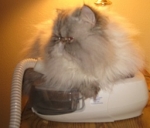OT- Knee replacement surgery
-
Tcamillemars
- Posts: 123
- Joined: Tue Oct 28, 2008 2:39 pm
- Location: Colorado
OT- Knee replacement surgery
I found out yesterday that my left knee is now officially bone on bone and the pain has become unbearable. The only solution is a total knee replacement. Unfortunately the new knee will only last about 15 years and I'm only 51. Has anybody had this done, and what did you do about anesthesia? Thanks.
Re: OT- Knee replacement surgery
You have my sympathy, a friend had both replaced, one when she was 55 and the other when she was 60...she's done well. Several others I know have had knee replacements in their 50s and also done well.
ResMed S9 range 9.8-17, RespCare Hybrid FFM
Never, never, never, never say never.
Never, never, never, never say never.
Re: OT- Knee replacement surgery
I had a hip replacement when I was 55 and it is still going strong. I am now 70. Most don't last quite this long but I have been fortunate.
Knee replacments are a bit more complicated and the therapy afterwards is more difficult (I have not had one but know this from friends who have).
I just saw a surgeon a couple of weeks ago about replacement of my right shoulder. I had my lest one replaced 14 years ago and it is still going strong too!
I did not have sleep apnea (at least it was not diagnosed) when I had these previous surgeries. I specifically asked the surgeon about anesthetic when a person has joint replacement surgery this time. He said it would be a combo - a light general and a local. He also said it would mean an extra night in the hospital.
He was talking about shoulder surgery but this may well apply to any surgery or it may just be the way he does things.
Hope this is some help!
Knee replacments are a bit more complicated and the therapy afterwards is more difficult (I have not had one but know this from friends who have).
I just saw a surgeon a couple of weeks ago about replacement of my right shoulder. I had my lest one replaced 14 years ago and it is still going strong too!
I did not have sleep apnea (at least it was not diagnosed) when I had these previous surgeries. I specifically asked the surgeon about anesthetic when a person has joint replacement surgery this time. He said it would be a combo - a light general and a local. He also said it would mean an extra night in the hospital.
He was talking about shoulder surgery but this may well apply to any surgery or it may just be the way he does things.
Hope this is some help!
_________________
| Machine: DreamStation Auto CPAP Machine |
| Mask: AirFit™ P10 Nasal Pillow CPAP Mask with Headgear |
| Humidifier: DreamStation Heated Humidifier |
| Additional Comments: Backups- FX Nano masks. Backup machine- Airmini auto travel cpap |
-
karessamom
- Posts: 259
- Joined: Mon Jun 30, 2008 12:18 pm
- Location: Utah
Re: OT- Knee replacement surgery
Both Amos and Jeeper have recently had knee replacements. you might try talking to them. They sometimes are in Chat. They seem to have done quite well. Jeeper in particular has done really well.
_________________
| Mask: Quattro™ FX Full Face CPAP Mask with Headgear |
| Additional Comments: back up mask--Ultra Mirage FF, Husband Resmed AUTOset8 w/H3i Heated Humidifier and ComfortGel FF mask |
Re: OT- Knee replacement surgery
You will likely be screened to see if you should see the Anesthesiologist prior to the surgery or at time of the surgery. You may wish to request seeing the Anesthesiologist before your surgery especially if you have ever had any complications with anesthesia or have had significant side effect of drugs with sedative side effects, such as being more sensitive to sedative side effects. I recently had surgery and had not planned to take my APAP as I was concerned about it becoming lost or not being used properly. The Anesthesiologist told me I had to bring the APAP to be placed in recovery. My mask was put on me in recovery, removed for transport between recovery and hospital room, paced again and when I woke up late evening all was working well except they needed to add water to humidifier I would prefer they forgot the water rather than risking getting water into machine. I did have my highest AHI during recovery, then had difficulty with sleep disturbance for about a week after surgery. My AHI still hasn't returned to presurgery but has improved. Viewing the data from APAP during recover was interesting!!! However, I had some complications with anesthesia which I suspect caused this. When the Anesthesiologist met with me to discuss post op complications, his recommendations was to always request to meet with the anesthesiologist prior to a surgery requiring general anesthesia.Tcamillemars wrote:I found out yesterday that my left knee is now officially bone on bone and the pain has become unbearable. The only solution is a total knee replacement. Unfortunately the new knee will only last about 15 years and I'm only 51. Has anybody had this done, and what did you do about anesthesia? Thanks.
My brother at 52 recently had knee replacement surgery and seemed to sail through it with much fewer complications than my surgery which should have been less of a hassle!!!!!
Good Lucky with you surgery!
elg5cats
_________________
| Machine | Mask | |||
 | ||||
| Additional Comments: , Mirage Micro Nasal, ResMed Airsence 10 for her with heated humifier | ||||
Only competition with a Bed of Kats for improved sleep is an xPAP approved by the Kats. In Memory: KoKo Macademia KitKat 10-20-1989--May 30. 2007....Kats are purrfect role models for sleep hygiene along with 2 snuggly Tibetan Spaniels.
- Sleepy Boy
- Posts: 241
- Joined: Thu Nov 06, 2008 5:55 am
- Location: South Branch Michigan
Re: OT- Knee replacement surgery
I had my right knee done 7-8 years ago. And I'm getting my left one done Oct. 18th. I'm 100% happy with the first replacement, and hope this one goes as good. If you do what they tell you, and workout like they tell you, I'd say you'll do good. The only people I ever heard of that didn't do well were the ones that wouldn't follow the program. Sleepy Boy....
Sleepy Boy
-
JimIllinois
- Posts: 104
- Joined: Sat Feb 07, 2009 3:36 pm
- Location: Illinois, USA
Re: OT- Knee replacement surgery
Modern replacement joints last longer than those installed 10 or 15 or more years ago. Materials are better; different ceramic materials have become more common.
I had a hip replacement three years ago. Ceramic ball, steel socket. The surgeon believes it will last 30 years. Life tests by the manufacturers are the only data, and they indicate much longer life than past products. I was told that the primary cause of failure over time is a reaction between steel and teflon in body fluids, causing the bone surrounding the new joint to dissolve over time. Things get loose and a repair is needed.
As good as the new materials are, I still am not supposed to run or jog or do anything that will put a lot of force on the joint.
This all relates to a hip, but I assume similar issues occur in a knee.
I had a hip replacement three years ago. Ceramic ball, steel socket. The surgeon believes it will last 30 years. Life tests by the manufacturers are the only data, and they indicate much longer life than past products. I was told that the primary cause of failure over time is a reaction between steel and teflon in body fluids, causing the bone surrounding the new joint to dissolve over time. Things get loose and a repair is needed.
As good as the new materials are, I still am not supposed to run or jog or do anything that will put a lot of force on the joint.
This all relates to a hip, but I assume similar issues occur in a knee.
Re: OT- Knee replacement surgery
Tcamillemars,
I have had both knees replaced. One two years ago when they used an epidural for anesthesia. I took my apap and was placed on it after I returned to the room. Anesthesiologist said the newer anesthetics don't cause issues with apnea like the older meds once did.
The other knee was replaced in July. This time the anesthesiologist asked that my apap be in recovery in case it was needed. Again, I didn't use it until I was back in the hospital room. The last surgery went extremely well. They gave me a shot in the upper thigh to deaden only the left leg and not the entire lower body as before. They also used a general anesthesia. The hospital did bring me an O2 adapter so oxygen could be run in my apap hose when I was using the apap.
I had no issues with my sleep apnea during either surgery. I checked my data following both surgeries and it looked like a normal night.
I would suggest you educate someone, who will be with you on surgery day, on how to set up and operate your cpap and mask.
Good luck.
Jeeper
I have had both knees replaced. One two years ago when they used an epidural for anesthesia. I took my apap and was placed on it after I returned to the room. Anesthesiologist said the newer anesthetics don't cause issues with apnea like the older meds once did.
The other knee was replaced in July. This time the anesthesiologist asked that my apap be in recovery in case it was needed. Again, I didn't use it until I was back in the hospital room. The last surgery went extremely well. They gave me a shot in the upper thigh to deaden only the left leg and not the entire lower body as before. They also used a general anesthesia. The hospital did bring me an O2 adapter so oxygen could be run in my apap hose when I was using the apap.
I had no issues with my sleep apnea during either surgery. I checked my data following both surgeries and it looked like a normal night.
I would suggest you educate someone, who will be with you on surgery day, on how to set up and operate your cpap and mask.
Good luck.
Jeeper
_________________
| Humidifier: HC150 Heated Humidifier With Hose, 2 Chambers and Stand |
| Additional Comments: Aussie heated hose |











